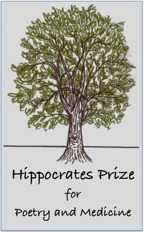New prize for budding young poets launched by Hippocrates Initiative
 Next year will see the awarding of the inaugural Hippocrates Prize for Schools, celebrating youth poetry on the subject of all things medical.
Next year will see the awarding of the inaugural Hippocrates Prize for Schools, celebrating youth poetry on the subject of all things medical.
The international award, for school students aged between 14 and 18, stems from the global success of the annual Hippocrates Prize which was launched by academics at the University of Warwick in 2009 to over four thousand entries from 44 nations, from Finland to Fiji.
Judge Clare Pollard, who published her first collection of poetry at the age of 19, said, “The great thing about poetry is that age doesn't matter. It's hard as a teenager to find the time and stamina to write a perfect novel, but you can write three perfect verses. If you put down the things you really want to say about our world, in your own voice, you will have written a powerful poem.”
She added, 'I'm very pleased to be judging the first Hippocrates Prize for Schools - in bringing science and art together. I hope it will deepen students' understanding of both, and uncover poets of the future.'
Michael Hulse, of the University of Warwick’s English and Comparative Literary Studies department, said, “The term ‘medical’ can be interpreted in the widest sense. The field of medicine allows for a diverse range of poetic muses; from personal experience of illness, birth or death, to hospitals, ambulances and doctors’ surgeries, to the nature and history of medical instruments, processes and drugs.”
Professor of Therapeutics at the University of Warwick, Donald Singer, who founded the Hippocrates Initiative with Michael Hulse commented, “Many outstanding poets have started writing great work at a young age. Our aim is for the Hippocrates Prize for Schools to encourage aspiring young poets to consider medicine as a theme for their poetry.”
The Hippocrates Prize for Schools is supported by the UK medical charity the Fellowship of Postgraduate Medicine and the UK National Association of Writers in Education.
Notes for Editors
For further information or to arrange interviews with University of Warwick contact Luke Harrison, Communications Manager on +44 (0)2476 574255/150483, m: +44(0)7920 531221 or luke.harrison@warwick.ac.uk
About the Hippocrates Prize for Schools: The closing date for entries to the Hippocrates Prize for Schools is 0000GMT on 1 February 2013. The first prize is GBP 500 for the winning student, with a further ten awards of commendation for the most highly rated entries. The prize applies for an unpublished poem of up to 50 lines in English on a medical theme. Full details and rules are posted on the Hippocrates Initiative website.
About the judge: Clare Pollard has published four collections of poetry, the most recent of which, Changeling (Bloodaxe, 2011) is a Poetry Book Society Recommendation. She published her first collection, The Heavy-Petting Zoo, with Bloodaxe in 1998 aged 19. Her play The Weather premiered at the Royal Court Theatre and her documentary for radio, ‘My Male Muse’, was a Radio 4 Pick of the year. She co-edited the anthology Voice Recognition: 21 Poets for the 21st Century and her new version of Ovid’s Heroines will be published by Bloodaxe in 2013.
About The Hippocrates Initiative: The Hippocrates Initiative began in 2009 as the Hippocrates Prize for Poetry and Medicine for an unpublished poem on a medical subject. The Hippocrates Initiative now also includes annual international symposia at which the Hippocrates awards are presented, an international research forum for poetry and medicine and The Hippocrates Press.
With a first prize for the winning poem in each category of £5,000, the Hippocrates prize is one of the highest value poetry awards in the world for a single poem.
The Hippocrates Initiative was awarded the 2011 Times Higher Education Award for Excellence and Innovation in the Arts.
Major support for the Hippocrates Initiative has come from the Fellowship of Postgraduate Medicine, with additional support from The Wellcome Trust, the Cardiovascular Research Trust, Heads, Teachers and Industry and the University of Warwick's Institute of Advanced Study.
